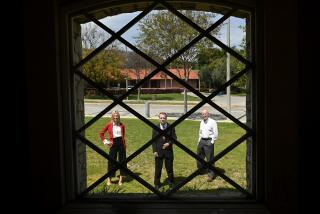Court: Mansions generally don’t need environmental review
Just because a planned home is huge doesn’t mean that it should receive additional environmental review, the California Supreme Court decided Monday.
The state high court’s ruling appears to clear the way for Mitchell Kapor, a computer magnate who founded the Lotus Development Corp., and his wife, Freada Kapor-Klein, to build a nearly 10,000-square-foot home, including a 10-car garage, on a steep hill in Berkeley.
Opponents contended that the house would increase the risk of landslides and require mammoth retaining walls and massive grading.
Monday’s decision, written by Justice Ming W. Chin, is likely to make it more difficult for activists to stop projects that would replace modest houses with mansions. The court said the state Legislature did not intend to require environmental impact reports for most houses built in urban areas.
The city of Berkeley approved a permit for the owners to tear down the existing house and replace it with a new home on a lot with a 50% grade. The new structure would take up about 16% of the lot.
“It is not enough for a challenger merely to provide substantial evidence that the project may have a significant effect on the environment,” Chin wrote.
Instead, opponents need to show that the planned house will have significant impact, and local planning agencies must determine whether the evidence justifies requiring additional environmental review.
Justice Goodwin Liu, joined by Justice Kathryn Mickle Werdegar, agreed that an appeals’ court decision calling for an environmental impact report had to be overturned because it was based on conjectural evidence.
But Liu called it “unfortunate that today’s opinion, instead of simplifying the law … adds further complexity to an area that many courts, practitioners, and citizens already find difficult to navigate.”
He said courts should merely decide whether “substantial evidence supports a fair argument that the project will have significant environmental effects” in weighing whether an environmental impact report is warranted.
The decision to overturn the court of appeal was unanimous. But Liu and Werdegar disagreed with the majority’s analysis.
Amrit Kulkarni, who represents the couple who wants to build the Berkeley home, said he was hopeful that the plans could now proceed.
“They have spent more than they should have to build a single-family home,” Kulkarni said.
An attorney for an association that has fought the project could not be immediately reached for comment.
Twitter: @mauradolan
More to Read
Start your day right
Sign up for Essential California for news, features and recommendations from the L.A. Times and beyond in your inbox six days a week.
You may occasionally receive promotional content from the Los Angeles Times.







